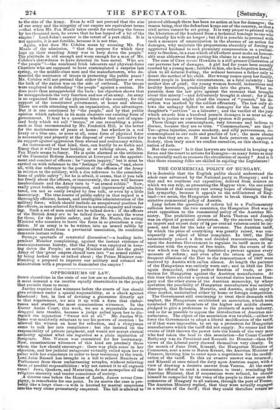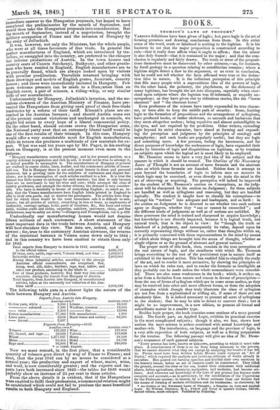THE COMMERCIAL POLICY OF HUNGARY.
IT is desirable that the English public should understand the whole case advanced by the National party in Hungary ; and to that end we continue our exposition, derived from sources on which we can rely, as presenting the Magyar view. On one point the friends of that country rest strong hopes of obtaining Eng- lish sympathy, because it appeals to the self-interest of Eng- land—we mean, the Hungarian desire to break through the re- strictive commercial policy of Austria. Long before the questions of reform led to a Parliamentary collision between the two countries, the Hungarian Diet was in overt opposition to the commercial policy of the Austrian Mi- nistry. The prohibitive system of Maria Theresa and Joseph was an object of general detestation. By the ancient laws, only an import and export duty of per cent ad valorem could be im- posed, and that for the sake of revenue. The Austrian tariff, by which the price of everything was greatly raised, was con- sequently an object of bitter complaint. In 1807, the Diet unanimously passed a firm and decided remonstrance, calling upon the Austrian Government to regulate its tariff more in ac- cordance with the system of free trade. But the events of the war which was then raging furnished a pretext against every measure of reform ; and even after the return of peace, the frequent allusions of the Diet to the remonstrance of 1807 were received by Austria with sullen silence. At length the patience of the Hungarians was entirely worn out ; and in 1843 the Diet again demanded, either perfect freedom of trade, or pro- tection for Hungarian against the Austrian manufactures. At this time there existed a system of internal duties between Hun- gary and the other states of the Austrian monarchy, by whose operation the possibility of Hungarian manufacture was entirely destroyed, that Bohemia, Moravia, and Austria, might enjoy a close market, undisturbed either by home or foreign competition. The Government still continuing to treat their demands with neglect, the Hungarians established an association, which soon numbered 120,000 members of the higher and middle classes, pledged to give a preference to the products of native industry, and as far as possible to oppose the introduction of Austrian ma- nufactures. The object of the association was twofold,—either to force the Government to adopt a liberal modification of the tariff, or if that were impossible, to set up a protection for Hungarian manufactures which the tariff did not supply. No sooner had the events of 1848 thrown the power into the hands of the very men who had taken the lead ill this association—for Count Casimir Bathyany was its President and Kossuth its Director—than the views of the Liberal party showed themselves very clearly. In the month of June 1848, Klauzal, the Hungarian Minister of Commerce, sent a note to Baron Kraust, the Austrian Minister of Finance, inviting him to enter upon a negotiation for the modifi- cation of the tariff. To this an evasive answer was returned ; and Klauzal at once raised the duty upon Austrian sugar, with a view of drawing a decisive answer from Vienna. At the same time he offered to send a commission to treat; reminding the Austrian Minister, that if concessions were refused, he should himself be compelled by the voice of the people to throw open the commerce of Hungary to all nations, through the port of Fiume. The Austrian Ministry replied, that they were actually engaged in a revision of the tariff; that they could therefore return no
immediate answer to the Hungarian proposals, but hoped to have completed the preliminaries by the month of September, and would then take the Hungarian proposals into consideration. But the month of September, instead of a negotiation, brought the military occupation of Fiume and the invasion of Hungary by the army of Jellachich.
It was, however, not only the Ministers, but the whole people, who were at all times favourers of free trade. In general the perfect manufactures of England, which are introduced by tra- vellers, or smuggled into the country, are preferred to the cheaper but inferior productions of Austria. In the town houses and country seats of Counts Szechenyi, Bathyany, and other gentle- men who have resided in England, English manufactures are to be generally found, which are always looked upon by visiters with peculiar predilection. Travellers returned bringing with them drawings and models of English grates, furniture, country houses ; and these were immediately imitated in Hungary. Few more welcome presents can be made to a Hungarian than an English razor, a pair of scissors, a riding-whip, or any similar trifle of our manufacture. Unfortunately for Hungary, Jellachich's invasion, and the no- torious slowness of the Austrian Ministry of Finance, have pre- vented the Hungarians from giving open proof of their free-trade tendencies by a reform of their tariff. Klauzzil's plans are en- tombed in the Austrian bureaux ; and should Austria come out of the present contest victorious and unchanged in councils, we might bid adieu to every hope of a liberal commercial policy. On the other hand, should success crown the Hungarian arms, the National party aver that an extremely liberal tariff would be one of the first results of their triumph. In this case, Hungary would offer a very considerable mart for English manufactures, while in return she produces a multitude of raw materials for ex- port. What was said ten years ago by Mr. Paget, in his sterling work on Hungary, is at the present moment even more to the purpose.
" Hungary. manufactures scarcely anything; and in her present position, as a country deficient in population and rich in soil, it would not be wise to attempt it, or indeed possible to accomplish it. The manufactures of Hungary at present are confined to coarse cloths, linen, leather, and the commonest articles of house- hold use. Yet in Hungary there is not only great luxury in dress and personal ornament, but a growing taste for the comforts of convenient and elegant fur- niture; nor is the consumption of such articles confined to a few. It is true the peasant has little money to exchange for such matters; but that is only because there are no merchants to buy his wine and corn; while amongst the class of country gentlemen, and amongst the richer citizens, the demand is very consider-
able. T i The taste is decidedly in favour of everything English ; so much so, in- deed, that the Vienna manufacturers have English labels printed in England to affix to their own goods, and so deceive the purchasers. The articles from Eng- land for which there would be the most immediate sale it is difficult to enu- merate; but all articles of cutlery, everything in iron or brass, as implements of husbandry, carriage springs, locks, parts of furniture, &c., fine linen and cotton goods, woollen stuffs and cloths, carpeting, saddlery, stationery, china, and fine earthenware, may besafely set down."—Hungary and Transylvania, vol. ii. p. 622.
Undoubtedly our manufacturing houses would not despise fifteen millions of such customers. A abort statement of the most important data in the trade between Austria and Hungary will best elucidate this view. The data are, indeed, not of the newest ; for, true to the customary Austrian slowness, the returns of the statistical bureaux in Vienna come down only to 1844 ; and in this country we have been enabled to obtain them only for 1842.
Total exports from Hungary to Austria in 1842, according to the official values 4,691,707 Of these, corn, cattle, rape-seed, Valonia wood, and wine 1,882,674 Industrial articles 2,809,000 Among these industrial articles, according to the strange Austrian official nomenclature, are comprised, flax, hemp, wool, silk, hides, feathers, rags, wax, tallow, and other raw produce, amounting in the whole to 2,324,619 Part of these products, however, find their way into other countries, during the transit from Hungary to Austria. Total imports, from Austria into Hungary, in manufactured articles, taken at the extremely low valuation of the Aus- trian tariff 3,903,196 The following table puts in a clearer light the nature of the trade between Hungary and Austria.
Imports from Austria into Hungary.
Austrian owls.* Austrian ewts.*
Cotton yarn, white 9,106 Linens 43,150 coloured 1,390 Woollens, common 19,115 — twist 3,389 Sue 12,684 Silk manufacture Cotton manufactures ... 77,583 1,206 Linen yarn thread 2,028 2,237 Hard-wares and cutlery 84,381
Exports from Hungary-1842.
Austrian erns.*
Austrian crrts.4
Tobacco 129,323 Wine 125,014 Oil, linseed, and rape ..... 28,038 Valonia 119,828
Wheat 1,377 637 Hemp 18,160 Maize 92,454 Hides 24,799 Rape seed 96,996 Wool 240,669
* = ishlbs. English.
Now we must remark, in the first place, that a considerable quantity of tobacco goes direct by way of Fiume to France; and next, that the year 1842 can by no means be considered as a normal year; the production and export of wheat, maize, wine, and wool, is now considerably greater; and the exports and im- ports have both increased since 1842—the tables for 1846 would probably show an increase of 2.5 per cent in these articles.
From the above details it is evident, that if the Hungarians were enabled to fulfil their professions, a commercial relation might be established which could not fail to produce the most beneficial results to both Hungary and England.



























 Previous page
Previous page